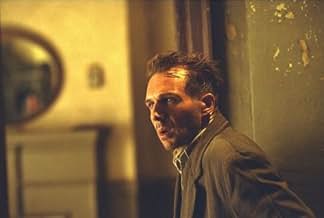AVALIAÇÃO DA IMDb
6,7/10
43 mil
SUA AVALIAÇÃO
Um homem com distúrbios mentais, passa a residir em uma casa de recuperação. Sua mente progressivamente volta para o reino criado por sua doença, repassando uma parte importante da sua infân... Ler tudoUm homem com distúrbios mentais, passa a residir em uma casa de recuperação. Sua mente progressivamente volta para o reino criado por sua doença, repassando uma parte importante da sua infância.Um homem com distúrbios mentais, passa a residir em uma casa de recuperação. Sua mente progressivamente volta para o reino criado por sua doença, repassando uma parte importante da sua infância.
- Direção
- Roteirista
- Artistas
- Prêmios
- 13 vitórias e 25 indicações no total
Avaliações em destaque
I've read a few of the other user comments about this film and often words and phrases like pretentious, dull, boring, lacking in entertainment are used. All fair comments, it is definitely not a film for a fantastical exciting escapist experience - however, I would suggest that a little effort on the part of the viewer will pay big dividends.
The first thing to say is that the actual plot of the film is not the main focus of the film. This is all about the madness, and subtle questions that are raised and need to be held in your mind throughout.
Every scene provides vital information, but do not forget we are seeing inside the 30 or 40 year old memories of a man who has spent most of his life in a mental asylum. I would not advise taking any scene at face value, particularly the flashbacks.
It is a challenging film and may at first seem to lack coherence, or be artsy for the sake of it. However, like the jigsaws that appear in the film in various forms it is the final pieces that are the hardest to deal with and potentially the most dangerous.
And at the end we are left with a question - is Spider's trauma the cause of his insanity, or is his insanity the cause of the trauma.
The first thing to say is that the actual plot of the film is not the main focus of the film. This is all about the madness, and subtle questions that are raised and need to be held in your mind throughout.
Every scene provides vital information, but do not forget we are seeing inside the 30 or 40 year old memories of a man who has spent most of his life in a mental asylum. I would not advise taking any scene at face value, particularly the flashbacks.
It is a challenging film and may at first seem to lack coherence, or be artsy for the sake of it. However, like the jigsaws that appear in the film in various forms it is the final pieces that are the hardest to deal with and potentially the most dangerous.
And at the end we are left with a question - is Spider's trauma the cause of his insanity, or is his insanity the cause of the trauma.
SPIDER (2003) *** Ralph Fiennes, Miranda Richardson, Gabriel Byrne, Bradley Hall, Lynn Redgrave, John Neville. Filmmaker David Cronenberg does it again : mixing psychological drama with Gothic mystery with the cloak of violence in the air with Fiennes (in a brilliantly mannered near mute turn) as the titular character, a schizophrenic recently released to a halfway house, nicknamed in his youth by his mother (Richardson who gives an excellent turn to the third power; she inhibits three interlaced roles that act as the story's linchpin) for his cat's cradle yarn confections which sends his scattershot memories into overdrive as he attempts to connect the missing pieces of his life. Told in intersperses of flashback Cronenberg expertly uses his persuasive powers of dread eke out the thin plottings of Patrick McGrath's novel who adapted the screenplay too that can tax on the nerves in long, baroque stretches of near silence. Dank, rotting production design by Andrew Sanders, excellently lensed by Peter Suschitzky and the chamber music-like score by Howard Shore makes the most of its broken-minded protagonist's living nightmare.
This film is one of the most under-rated, I have to say. I know it takes awhile to get into and you have to use your mind while you watch it but it's not THAT complicated, is it? Especially if you watch this film more than once you really become to understand what it is it with Spider. I don't want to give away the plot, because you really have to see it for yourself. It's surprising and pleasantly different.
I have to highlight the acting in the film, it's that superb. All the actors are just simply amazing, taking the acting to a completely new level. So, if you want to try something that's not so mainstream film-making, watch Spider. I dare you.
I have to highlight the acting in the film, it's that superb. All the actors are just simply amazing, taking the acting to a completely new level. So, if you want to try something that's not so mainstream film-making, watch Spider. I dare you.
There are always films that people will either see what the director was going for, or simply won't connect with the film. David Cronenberg's Spider is one of those films.
Many comparisons can be made between this film and the Ron Howard film A Beautiful Mind in that they both examine the complexities of mental illness. Whereas Howard took the glamorous Hollywood style approach -- complete with government agents and associated adventures -- Cronenberg continues to prove that less is more when it comes to film. Spider is significantly more effective in that it does not candy coat its subject, rather approaching the scenario with brute realism.
Cronenberg is certainly one of the most under-appreciated and misunderstood directors of our age in terms of popular appeal. His films are not for mass marketing and popcorn sales, but rather are psychologically and sociologically challenging to the viewer. Cronenberg films generally demand a surrender from the audience to an unsettling reality, and Spider is no different. The fractured perception offered by the protagonist as displayed through Cronenberg's eye is truly unique and refreshing.
If you are the type of person who is up for quick, easy entertainment, Spider is not your film. But, if you want to explore a brilliantly crafted submergence into the strange reality of a mentally ill person, Spider will leave you wanting more. Cronenberg has once again proved that there are few directors of his talent and skill. His ability to create a wholly original feel in film incomparable to any of his contemporaries is always welcomed by this viewer.
Many comparisons can be made between this film and the Ron Howard film A Beautiful Mind in that they both examine the complexities of mental illness. Whereas Howard took the glamorous Hollywood style approach -- complete with government agents and associated adventures -- Cronenberg continues to prove that less is more when it comes to film. Spider is significantly more effective in that it does not candy coat its subject, rather approaching the scenario with brute realism.
Cronenberg is certainly one of the most under-appreciated and misunderstood directors of our age in terms of popular appeal. His films are not for mass marketing and popcorn sales, but rather are psychologically and sociologically challenging to the viewer. Cronenberg films generally demand a surrender from the audience to an unsettling reality, and Spider is no different. The fractured perception offered by the protagonist as displayed through Cronenberg's eye is truly unique and refreshing.
If you are the type of person who is up for quick, easy entertainment, Spider is not your film. But, if you want to explore a brilliantly crafted submergence into the strange reality of a mentally ill person, Spider will leave you wanting more. Cronenberg has once again proved that there are few directors of his talent and skill. His ability to create a wholly original feel in film incomparable to any of his contemporaries is always welcomed by this viewer.
David Cronenberg's film, based on a novel adapted by its author, Patrick McGrath, is set in London in the late 1980's, and explores the effects of an infamous Conservative government policy, whereby expensive, outdated mental hospitals were streamlined and the inmates released with limited supervision, a process that was termed Care in the Community. The film focuses on Spider, an elusive mental patient, institutionalised for most of his life, now released and returned back to a halfway house in East London, the place of his childhood, to fend for himself in the outside world.
This does not look to the uninformed like a Cronenberg film, there being no teleportation, telepathic head-blowing or the like, but once viewed, the film is clearly in Cronenberg's territory. From the beginning of the 1990's, he has seemed to be searching (it seems to me at times desperately) for new subjects in which to explore his morbid fascination. This fascination concerns the consequences of illness. Illness is given outrageous forms in his earlier films, a car accident which debilitates Christopher Walken in The Dead Zone, for instance, one of its effects being morbid clairvoyance. In Spider, Cronenberg focuses on the effect of illness on the brain, with its manifestation in what we would call the real world, when scientists actually view our 'real' world as a simulation made by our brains (and therefore our bodies).
As ever, Cronenberg, unlike other directors, does not condescend and go for the easy option, in other words making Spider a neatly disturbed, good-looking human, glamorised by his tragic sense of unreality, i.e. A Beautiful Mind. Instead, he really explores what it might be like for an intelligent man who tries to make sense of a world and past warped by mental disturbance, and questions his perception and sense of reality. Cronenberg gives Spider pathos and humanity, but never glamorises him.
Ralph Fiennes inhabits Spider naturally and impressively, bringing to the role his consistent qualities of commitment and intensity. The supporting cast is wonderful. Gabriel Byrne plays Spider's father with his rich sourness and Miranda Richardson, in a double role, shows why she is such a hidden, rough gem of British acting (at least to the wider world).
In Spider, Cronenberg Is Back To His Best With A Characteristically Original Film About Society and Mental Illness
This does not look to the uninformed like a Cronenberg film, there being no teleportation, telepathic head-blowing or the like, but once viewed, the film is clearly in Cronenberg's territory. From the beginning of the 1990's, he has seemed to be searching (it seems to me at times desperately) for new subjects in which to explore his morbid fascination. This fascination concerns the consequences of illness. Illness is given outrageous forms in his earlier films, a car accident which debilitates Christopher Walken in The Dead Zone, for instance, one of its effects being morbid clairvoyance. In Spider, Cronenberg focuses on the effect of illness on the brain, with its manifestation in what we would call the real world, when scientists actually view our 'real' world as a simulation made by our brains (and therefore our bodies).
As ever, Cronenberg, unlike other directors, does not condescend and go for the easy option, in other words making Spider a neatly disturbed, good-looking human, glamorised by his tragic sense of unreality, i.e. A Beautiful Mind. Instead, he really explores what it might be like for an intelligent man who tries to make sense of a world and past warped by mental disturbance, and questions his perception and sense of reality. Cronenberg gives Spider pathos and humanity, but never glamorises him.
Ralph Fiennes inhabits Spider naturally and impressively, bringing to the role his consistent qualities of commitment and intensity. The supporting cast is wonderful. Gabriel Byrne plays Spider's father with his rich sourness and Miranda Richardson, in a double role, shows why she is such a hidden, rough gem of British acting (at least to the wider world).
In Spider, Cronenberg Is Back To His Best With A Characteristically Original Film About Society and Mental Illness
Você sabia?
- CuriosidadesDavid Cronenberg received the screenplay from Patrick McGrath out of the blue, with a note attached saying that Ralph Fiennes was interested in playing the part of Spider. After about four pages, Cronenberg had decided that he wanted to do the film.
- Erros de gravaçãoCamera is reflected in broken window of asylum.
- ConexõesFeatured in SexTV: Dark Desires: Sexuality in the Horror Film (2003)
Principais escolhas
Faça login para avaliar e ver a lista de recomendações personalizadas
- How long is Spider?Fornecido pela Alexa
Detalhes
Bilheteria
- Orçamento
- US$ 10.000.000 (estimativa)
- Faturamento bruto nos EUA e Canadá
- US$ 1.642.483
- Fim de semana de estreia nos EUA e Canadá
- US$ 5.575
- 22 de dez. de 2002
- Faturamento bruto mundial
- US$ 5.808.941
- Tempo de duração
- 1 h 38 min(98 min)
- Cor
- Mixagem de som
Contribua para esta página
Sugerir uma alteração ou adicionar conteúdo ausente





























